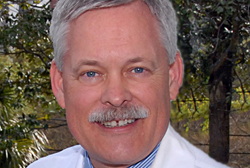 |
John Feussner, M.D. |
Often referred to as bench-to-bedside or bench-to-community research, some definitions go so far as to include detailed descriptions of the expertise needed to conduct such investigations.
For John Feussner, M.D., chairman of internal medicine at Medical University of South Carolina, it boils down to one basic element.
“Research is clinical when the smallest unit of investigation is an intact human patient,” he said on Thursday during the annual UNMC Strategic Planning Retreat.
Dr. Feussner, who helped grow clinical research at MUSC, urged UNMC to embrace three principles as it attempts to expand its clinical and translational research enterprise:
- Make clinical research a priority;
- Invest in the faculty needed to conduct the work; and
- Protect productive research time.
With the formation of a Center for Clinical and Translational Research and other campus initiatives, UNMC has made clinical research a priority, he said.
To continue momentum from that development, Dr. Feussner said UNMC must recruit, retain and train quality clinical investigators.
“It’s all about the people, if the organization is excellent, it’s because the people are excellent,” he said.
|
“Basic scientists have the advantage of being able to go back to a lab that is dedicated to research,” Dr. Feussner said, noting that for clinical researchers, the clinic is the lab, and it’s often hard to make time for research in the clinic when there are patients to be seen.
He urged UNMC to creatively carve out and protect time for clinical researchers to conduct investigations.
Jennifer Larsen, M.D., associate vice chancellor for clinical research, echoed Dr. Feussner’s comments.
She also added that medical center researchers should work to build bridges between clinical and basic science investigators, seek new funding sources and foster strong mentoring relationships between junior and senior faculty members.